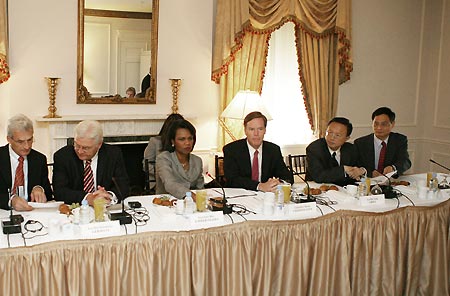Representatives of the five permanent members of the United Nations Security Council plus Germany reiterated in New York on Friday their call for Iran to suspend nuclear activities.
"The proliferation of risks of the Iranian nuclear program remain a source of serious concern to the international society," said a joint statement by the US, Russia, China, Britain, France and Germany after their meeting on Iran.
"We seek a negotiated solution that would address the international community's concerns over Iran's nuclear program," said the statement, noting Iran should suspend its enrichment-related and reprocessing activities to make way for the negotiations.
Javier Solana, the EU High Representative for Common Foreign and Security Policy, has been asked to meet with Ali Larijani, Secretary of Iran's Supreme National Security Council, to lay the foundation for the future negotiations, the statement said.
The six countries demanded Iran fulfill the requirements of UN Security Council Resolutions 1737 and 1747, including the suspension of its enrichment and reprocessing activities, or it will face a new sanction resolution from the Security Council.
"We agree to finalize a text for a third UN Security Council sanctions resolution ... unless the November reports of Dr. Solana and Dr. El Baradei show a positive outcome of their efforts," the statement warned.
Solana and El Baradei, chief of the International Atomic Energy Agency, have been sparing no effort for years to negotiate with Iran over its nuclear program.
Solana has held long-running talks with Larijani offering economic and security incentives if Iran halts its most sensitive nuclear work.
The US has long accused Iran of trying to develop nuclear weapons under the cover of a civilian nuclear program. Iran always denies the US charges and insists that its nuclear program is for peaceful purposes only.
Taking the lead to work out a tougher resolution by the Security Council to press Iran to give up its nuclear program, US Secretary of State chaired the Friday meeting in a bid to reach an agreement on Iran.
The UN Security Council has adopted two resolutions - one in December 2006 and the other in March this year - to force Iran to suspend uranium enrichment activities and to give up its nuclear program.
Facing Iran's defiant of world demands, the US and Russia have different views over the issues of imposing new sanctions against Iran's disputed nuclear program.
Russia is currently opposed to impose new sanctions, which will be the third if it is adopted by the UN Security Council, Russian mass media quoted its foreign minister, Sergei Lavrov, as reporting on Thursday.
The UN Security Council should give Iran more time to carry out its agreement with the International Atomic Energy Agency (IAEA), said Lavrov, who was here attending the UN General Assembly at the time.
In response to what Lavrov said, US Ambassador to the United Nations Zalmay Khalilzad told reporters the IAEA agreement was a technical one and should not delay any action by the Security Council.
"That cannot be used as a shield to protect Iran from its lack of implementation of the demands of the Security Council in regard to the enrichment of uranium that Iran has been asked to suspend twice," he said.
It was reported that Lavrov and US Secretary of State Condoleezza Rice exchanged sharp words at a meeting of major industrial states here Wednesday when he condemned Western moves to take unilateral sanctions outside the UN framework if the Security Council was deadlocked.
Germany, the biggest European trading partner of Iran, is believed to have been taking a neutral stand, insisting that further sanctions must be within the UN framework and conditional on avoiding the use of military force against the Islamic Republic.
(Xinhua News Agency September 29, 2007)


